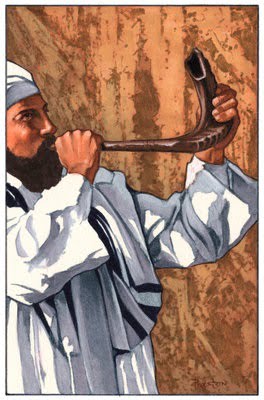Thursday: Year of Jubilee
Meeting the Israelites as a people who had no home of their own and who were waiting for their arrival in the Promised Land, God knew the importance that the land would take on as they established their new society in Canaan. Under the leadership of Joshua, God oversaw an orderly distribution of the land by tribe and family groups.
But He also knew that over time the wealth, opportunity, and resources that were connected with landholding would tend to become concentrated in the hands of the few. Family difficulties, ill health, poor choices, and other misfortune might cause some landholders to sell their lands for short-term gain or simply to survive, but this would mean the family might be dispossessed for successive generations.
God’s solution was to decree that land could never be sold absolutely. Instead, land would be sold only until the next “year of jubilee”, at which time the land would revert to its allotted family, and any land sold could be redeemed by the seller or another member of the seller’s family at any time. Again, God reminds the people of their relationship to Him and how that affects their relationships with others: “The land must not be sold permanently, because the land is mine and you reside in my land as foreigners and strangers” (Lev. 25:23, NIV).
Read Leviticus 25:8-23. How do you imagine society would be different if these principles were applied, especially the words “you shall not oppress one another”?
“The regulations that God established were designed to promote social equality. The provisions of the sabbatical year and the jubilee would, in a great measure, set right that which during the interval had gone wrong in the social and political economy of the nation”. – Ellen G. White, Patriarchs and Prophets, p. 534.
Bible historians are unsure as to whether these economic and social rhythms were ever fully followed for any significant period of time (see 2 Chron. 36:21). Even so, these rules offer an intriguing glimpse into how the world might work if God’s laws were fully followed. Moreover, they underline God’s particular concern for the poor and the marginalized, as well as His concern that fairness be manifested in practical ways in our world.


In Australia, there is considerable debate about the issue of Aboriginal landrights. Looking beyond some of the political rhetoric one can see that the Aboriginal peoples regarded land as something beyond ownership and wealth. They understood the concept of caretaking.
Palyku woman Ambelin Kwaymullina explains:
This relationship was ignored by the colonists who came to Australia and seized the land for themselves, owning it and doing what they wanted with it without any notion of preserving it for future generations.
While some see the Aboriginal land-rights movement as an “a postiori” attempt at seizing their land back, there is also a recognition that their sense of responsibility for the land ultimately goes much deeper than ownership. This is somewhat similar to the jubilee principle that was given to the Israelites.
What does this mean for us? I doubt where the current greedy system of ownership and inheritance can be overturned. But, we can embrace the two principles of responsibility for resource management and social equality that lie at the root of the jubilee notion. Just because we believe that Jesus is coming soon and will provide the ultimate solution to the problem, that does not absolve us from doing our part now.
The so called “indians” in South America were equally destroyed by the european colonization (as Aboriginal peoples in Australia). All under the context of greed. This never self-sustainable lifestyle continues to permeate our culture. Unfortunately, a true cult to exploitation and growth is currently practiced. Today, most of the companies (if not all) use terms such as eco-responsability just because is fashionable. Governments and the actual concept of country itself is basically defined by financial gains. Preservation and quality of life have been like art, something simply to look at and to cause emotions! Basically just a theory! As inhabitants of this huge and beautiful house of ours, we are certainly failing our duty to preserve it. Thanks to concepts found in ancient writings,
such as the Bible, only faith can save humanity.
God gave these rules for our safety.
God gave these rules so we shall lack nothing.
When you are dependent on Me I will provide for your need is God’s promise to us.
Not one or two years. His provision will not run out until the harvest in the third year.
For He who promised is faithful.
Only until the breath remains in me, I can claim ownership of the earthly things.
For dust you are, and to dust you shall return.”
Live as you were to die tomorrow. Learn as you live forever. Mahatma Gandhi.
Luke 10:42 42 But only one thing is necessary. Mary has chosen the good portion, and it will not be taken away from her.”
Have you found the portion (inheritance) that will not be taken away?